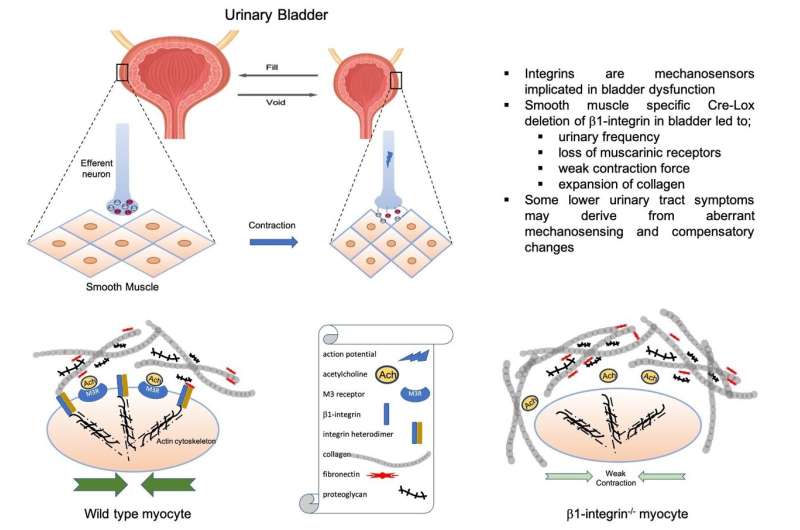Faulty neurotransmitter causes weak, overactive bladder in mice

Urinating more frequently and in lower volumes can be a sign of overactive bladder, according to physiologists from Beth Israel Deaconess Medical Center and Harvard Medical School in Boston. Researchers investigated how the smooth muscle in the bladder of mice senses and responds to mechanical forces as it fills with urine, then expels it rapidly several times a day. Additionally, researchers uncovered shorter intervals between voids and much less pressure generated by the bladder to expel urine made the bladder appear weaker.
They also found that an important neurotransmitter (acetylcholine) couldn't trigger the bladder muscle to contract because its receptor on the smooth muscle cells was no longer being produced. This caused the bladder to become weaker. A look at the muscle under a microscope showed it was drastically reduced in thickness and very disorganized. These findings resemble several lower urinary tract symptoms seen in people.
Certain proteins and ion channels are known to activate or stimulate intracellular signaling in response to a mechanical stimulus such as stretch. Researchers zeroed in on the most highly expressed protein b1-integrin. By eliminating b1-integrin only in smooth muscle tissues in adult mice, physiologists were able to investigate the functional effects of the protein on the bladder and its overall architecture.
"A very large proportion of people suffer from problems with urination, particularly with age," said study co-author Warren G. Hill, Ph.D., of Harvard Medical School. "Understanding the cellular and molecular signaling that occurs in response to sustained abnormal physical stress in the bladder muscle will allow us to design drugs that can better target these common complaints that adversely affect quality of life for tens of millions of people."
"Deletion of mechanosensory β1-integrin from bladder smooth muscle results in voiding dysfunction and tissue remodeling" is published ahead of print in Function.
More information: Weiqun Yu et al, Deletion of mechanosensory β1-integrin from bladder smooth muscle results in voiding dysfunction and tissue remodeling, Function (2022). DOI: 10.1093/function/zqac042



















